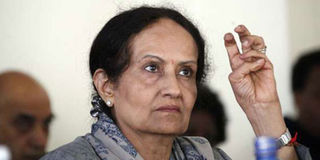Justice system thrown in spin over retirement age

Deputy Chief Justice Kalpana Rawal at a Nairobi hotel during a past forum. Justice Rawal will act as the Chief Justice after Dr Mutunga's retirement. PHOTO | EVANS HABIL | NATION MEDIA GROUP
What you need to know:
- Had the ruling stood, it would have meant that the Supreme Court would not have been properly constituted as it would have lost three of its seven judges within weeks.
- At least 40 other judges in the Court of Appeal and High Court would also have been affected by the retirement ruling.
The Judiciary was on Friday thrown into a spin after a ruling which had sent home Deputy Chief Justice Kalpana Rawal and Supreme Court Judge Philip Tunoi was put on hold.
Had the ruling stood, it would have meant that the Supreme Court would not have been properly constituted as it would have lost three of its seven judges within weeks.
The court’s president Willy Mutunga, who is also the Chief Justice, is set to retire mid next month.
The court must have at least five judges to be properly constituted but it would have had only four — without its president and deputy.
However, the stay order means the uncertainty that has gripped the country’s justice system over the retirement of Ms Rawal and Mr Tunoi as well as scores of other judges will continue.
It also raises questions as to whether the Supreme Court judges who have taken positions on the retirement issue can hear one of their own on the matter.
At least 40 other judges in the Court of Appeal and High Court would also have been affected by the retirement ruling.
Many of them were appointed under the old constitution which allowed judges to retire at 74 years. The new Constitution sets the retirement age at 70.
Court of Appeal judges GBM Kariuki, Milton Makhandia, William Ouko, Kathurima M’inoti, Patrick Kiage, Otieno Odek and Jan Mohamed upheld a decision of the High Court which had ruled that “all judges are supposed to retire at the age of 70”.
“We hereby dismiss the two appeals filed by Judges Rawal and Tunoi. The retirement age of all judges serving under the new Constitution is 70.”
The Appeal Court judges said that Section 62 (1) of the old constitution under which Judges Rawal, Tunoi and over 40 others were appointed, was not exported into the new Constitution to enable them continue to serving until they attain the age of 74.
The ruling had also put in doubt the proceedings of the Philip Tunoi tribunal and divided opinion among lawyers.
“The tribunal will have no further role to play since the judge is no longer in office,” lawyer Charles Kanjama said before the stay order was issued by Supreme Court judge Njoki Ndung’u.
CRUCIAL QUERRIES
But constitutional lawyer Wachira Maina disagreed, saying this was a misreading of the Constitution.
"What is at issue is ‘judicial misconduct,’ namely what Tunoi did when he was a judge. The only difference this decision makes is that Tunoi can no longer be sacked. And if the tribunal makes a finding that there is misconduct that amounts to a criminal offence, it could still recommend that he be indicted," he said.
Judge Ndung’u certified as urgent the application filed by lawyer Kioko Kilukumi for Justice Rawal a few minutes after the seven judges delivered their judgment, which lasted for almost three hours.
“Pending the hearing and determination of the application, a conservatory order is hereby issued directing that the decision of the High Court, affirmed by the Court of Appeal today, May 27, 2016, to the effect that the retirement age of judges appointed before August 27, 2010, (when the new Constitution was promulgated) is 70 is suspended,” Justice Ndung’u ruled.
The judge directed Justice Rawal to continue discharging her constitutional, judicial and administrative duties.
The judge also ordered the Chief Registrar, Ms Anne Amadi, and the Judicial Service Commission (JSC) not to “advertise in any media whatsoever vacancy in the office of the DCJ and the Vice President of the Supreme Court of Kenya or to commence in any manner the recruitment process.”
The chief registrar and JSC have also been stopped from issuing any retirement notices to the DCJ.
The judge directed the appeal be heard on June 24, when the current Chief Justice, Dr Willy Mutunga will have left office.
IMPORTANT ROLE
But this raised its own legal and constitutional questions as to who in the Supreme Court will hear Justice Rawal’s appeal.
"Justice Tunoi cannot sit since he is an interested party and is facing a judicial tribunal on allegations of bribery. Justice Rawal cannot sit, since it is her case. Justices Njoki and Ojwang should not sit, having prejudged the question long before it had come before them. If a Supreme Court Bench cannot be properly and ethically constituted, should the Supreme Court even consider an appeal at all? Mr Maina asks.
Mr Muite says the burden will now be on the JSC, which will now have to recruit the Chief Justice and the Deputy almost concurrently.
The Justice Rawal will act as the Chief Justice after Dr Mutunga's retirement.
The Supreme Court, a creation of the 2010 Constitution, is an important stabiliser in the country especially in determining a disputed presidential election as it happened in 2013 when Cord candidate Raila Odinga challenged Uhuru Kenyatta’s win.
The country is presently embroiled in an intense wrangling – complete with demonstrations which have been violently quelled – over the referee of the general election due in August next year.




